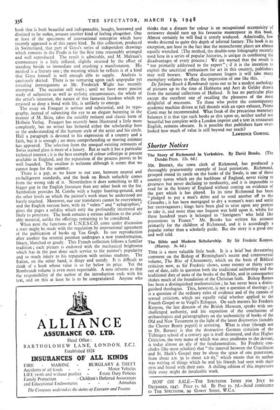The Bible and Modern Scholarship. By Sir Frederic Kenyon. (Murray.
3s. 6d.)
THIS is a most valuable little book. It is a brief -but devastating comment on the Bishop of Birmingham's recent and controversial volume, The Rise of Christianity, which on the basis of Biblical criticism now, as Sir Frederic shows, some twenty or thirty years out of date, calls in question both the traditional authorship and the traditional date of most of the books of the Bible, and in consequence shakes much of the foundation of the Christian faith. Bishop Barnes has been a distinguished mathematician ; he has never been a distin- guished theologian. This, however, is not a question of theology ; it is a question of the ordinary rules of evidence and of the canons of textual criticism, which are equally valid whether applied to the Fourth Gospel or to Virgil's Eclogues. On such matters Sir Frederic Kenyon, the late director of the British Museum, speaks with un- challenged authority, and his exposition of the conclusions of archaeologists and palaeographers on the .authenticity of books of the Old and New Testament in the light of the latest discoveries (notably the Chester Beatty papyri) is arresting. What is clear (though not to Dr. Barnes) is that the destructive German criticism of the Tubingen school of a century ago is itself destroyed, and that Higher Criticism, the very name of which was once anathema to the devout, is today almost an ally of the fundamentalists. Sir Frederic con- cludes (like most scholars) that " the interval between the Crucifixion and St. Mark's Gospel may be about the space of one generation, from about A.D. 30 to about A.D -65," which means that its author was writing of things which he and his friends had seen with their eyes and heard with their ears. A shilling edition of this impressive little essay might do invaluable work.






























 Previous page
Previous page